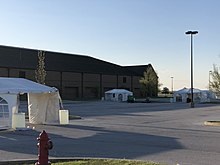|
|
| |
|
|
| |
|
|
|
|
| |
 |
| A temporary drive-in
testing site for COVID-19 set up with tents in a
parking lot. |
Testing
COVID-19 testing can help find the SARS-CoV-2 virus.
There are two types of test; one can find the virus, and
the other that can find antibodies produced in response
to infection.
An accurate mortality rate of the disease and the level
of herd immunity in the population can be found from the
results of these tests. However, it is still not known
how long immunity will last, and how effective it will
be.
Due to limited testing, as of March 2020, no countries
had reliable data of the virus. |
|
|
Detection Timing |
- Viral burden (the amount of virus)
measured in the respiratory tract declines after the
start of illness.
- At this time, replication-competent
virus has not been successfully cultured more than nine
days after the illness.
- As isolating replication-competent
virus lowers, anti-SARS-CoV-2 IgM and IgG can be found
in an increasing number of persons recovering from
infection.
- Attempts to grow the virus from
upper respiratory specimens have been largely
unsuccessful
- Following recovery from the illness,
many patients no longer have detectable viral RNA in
upper respiratory.
- No clear link has been seen between
length of illness and length of recovery.
- Infectious virus has not been grown
from urine or feces; these possible sources have a very
small risk of spreading infection.
|
|
WHO methods
As of 7 April 2020, the WHO had accepted two diagnostic
tests under the Emergency Use Listing procedure (EUL)
for use during the COVID‑19 pandemic. Both in vitro
diagnostics, the tests are genesig Real-Time PCR
Coronavirus (COVID‑19) created by Primerdesign, and
cobas SARS-CoV-2 Qualitative assay for use on the cobas®
6800/8800 Systems by Roche Molecular Systems. Approval
means that these tests can also be given away by the
United Nations.
How accurate is this?
In March 2020 China reported problems with accuracy in
their test kits.
In the United States, the test kits developed by the CDC
had "flaws".
80% of test kits the Czech Republic purchased from China
gave wrong results. |
|
Inventions
A group of scientists from Hokkaido University developed
an antibody test that could detect avian flu antibodies
in only 20 minutes. They said their test could be
changed to detect SARS-CoV-2. |
|
 Kiddle:
Testing Kiddle:
Testing
Wikipedia: Testing |
|
|
|
|
|
|
|
|
|
|
|
|
|
|
|
|
Search Fun Easy English |
|
|
|
|
|
|
|
|
|
|
|
|
|
|
|
About
Contact
Copyright
Resources
Site Map |